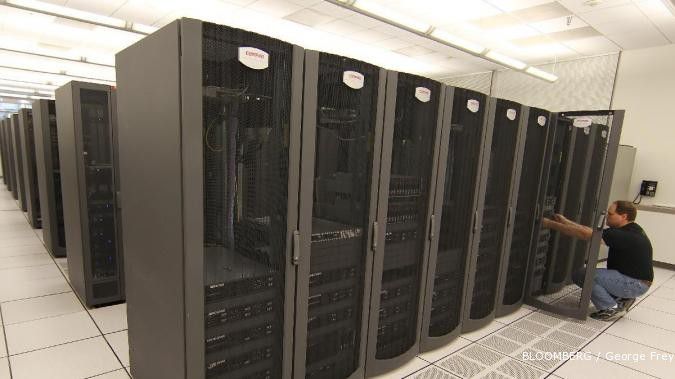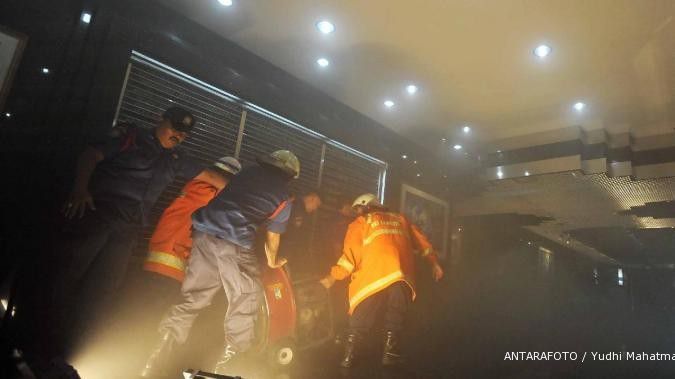The current dry season and carelessness have led to a spike in the number of major fires in Jakarta during Ramadhan, according to the city’s fire chief.
Four major fires have broken out since Muslims throughout the city began to fast on July 19, including the latest conflagration in Glodok, West Jakarta, when 27 stores at Harco Glodok, one of the largest electronics centers in the city, were destroyed on Sunday.
More than 20 fire companies were dispatched to put out the fire, which was confined to the third floor of the center and caused an estimated Rp 8 billion (US$848,000) in damage. No casualties were reported.
Investigators suspect that the fire was triggered by a short circuit, one of the most common causes of fires in the nation’s densely populated cities, where illegal electricity tapping is rampant.
Jakarta Fire Department chief Paimin Napitulu told The Jakarta Post on Sunday that three to four fires were reported every day in the capital during Ramadhan.
Three huge fires struck densely populated areas in different parts of Jakarta during last week alone.
Four-hundred families in Tambora, North Jakarta, lost their homes to fire on Aug. 8. A blaze also broke out in Tambora on July 28, resulting in the deaths of three children and the destruction of 175 homes.
Fire consumed a housing complex in Karet Tengsin, Central Jakarta, after Muslims broke the fast on Aug. 6, destroying 405 homes and displacing 565 families. The fire was caused by a short circuit that caused a cell phone to explode while charging, officials said.
Further, just hours before the Karet Tengsin fire, 125 residents of Kampung Jembatan in Cipinang Besar Selatan, East Jakarta, were also left homeless after their houses were destroyed by a fire.
Panin attributed most of the fires in the city to carelessness, saying that the change to daily routines during the fasting month had made people less attentive to potential dangers.
“Moreover, it is now dry season,” Panin said. “Fires can spread quickly once they are lit.”
Urban planning expert Nirwono Joga agreed with the fire chief, saying that carelessness coupled with the dry season were the main factors behind the fires.
However, Nirwono also placed some of the blame on the Jakarta administration. “For years, the data has shown that fires tend to break out in densely populated areas. The city government has to make a bold move to relocate people in such areas to low-cost apartments and provide them with jobs.”
Nirwono also defined a role for local communities. “We also have to improve the social awareness of the people by conducting training to form volunteer fire brigades in every neighborhood unit [RW]. I found similar programs in Yogyakarta and Pontianak. Jakarta is supposed to have a bigger local budget, so why can’t we do it?”
The Jakarta administration recorded 530 fires between January and July that claimed 31 lives and caused Rp 172.4 billion in damage. Officials attributed the cause of 370 of the fires to electrical problems and 57 fires to faulty stoves.
Seventy people were injured in the fires and 3,144 families, comprising 11,686 people, lost their homes.
The number of fires in the first half of 2012 was much larger than the 300 recorded in the same period last year.
There were almost 1,000 fires recorded in 2011, resulting in 18 deaths and 87 injuries, including 13 firefighters. The total estimated damage from fires in 2011 in Jakarta was estimated to top Rp 217 billion. (aml)
Jakarta is burning during dry Ramadhan
August 13, 2012, 04.04 PM
/2012/08/13/401536935.jpg)
ILUSTRASI. Petugas melakukan bongkar muat vaksin COVID-19 produksi Moderna yang dikirim dari Amerika Serikat, setibanya di Terminal Cargo Bandara Internasional Soekarno Hatta, Tangerang, Banten, Minggu (11/7/2021).
Reporter: Rika Theo
| Editor:
Latest News
-
February 24, 2026, 03.38 PM
Eni to Reach Final Investment Decision for Indonesia Gas Projects Next Month
-
February 24, 2026, 01.00 PM
Asia Stocks Try to Steady after Wall Street Selloff Sims Mood
-
February 23, 2026, 04.50 PM
Wall Street Futures and Dollar Slide on Trump Tariff Tumult
-
February 23, 2026, 02.17 PM
Indonesia's Government Spending Jumps 26% in January 2026
-
February 23, 2026, 01.47 PM
Indonesia's Government Spending Jumps 26% in January
-
February 21, 2026, 06.00 AM
Indonesia's Pertamina to Maintain Bidding Process for US Energy Imports
-
February 20, 2026, 01.23 PM
Indonesia Secures 19% Tariff Deal with US, Palm Oil and Other Commodities Exempt
-
February 20, 2026, 08.33 AM
Indonesia, US Sign Agreement on Reciprocal Trade, Indonesian Ministry Says
-
February 19, 2026, 08.12 AM
Indonesia, Freeport Units Sign MoU to Extend Mining Permit beyond 2041











